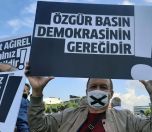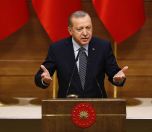Today is January 10 Working Journalists Day in Turkey.
On the occasion of January 10, the International Press Institute has released a written statement and expressed solidarity with journalists across Turkey.
The Institute has released its statement with the emphasis, "Day lays bare paradox: Journalists in Turkey cannot work without fear or censorship."
Calling on the authorities to "end the abuse and persecution of the profession", the IPI has reminded that in the last years, especially since the coup attempt on July 15, 2016, over 3,000 journalists have lost their jobs.
"While there are numerous steps needed to rebuild the profession, the most urgent is for the state authorities to stop the constant judicial and financial pressure and harassment of media and journalists who do not promote the government's political interest", the IPI has further emphasized.
The Institute has stated the following in brief:
'Hundreds of journalists jailed, prosecuted and convicted'
"On January 10, journalists across Turkey will mark 'Working Journalists Day' to recall the struggle for the rights of journalists and their crucial democratic role in informing the public.
"The International Press Institute (IPI), a global network of editors, media executives and leading journalists, takes the opportunity of the Working Journalists Day to express solidarity with journalists across Turkey and to call upon the authorities to end the abuse and persecution of the profession.
"In the last few years, over 3,000 journalists lost their jobs as a result of the forced closures of media in the wake of the 2016 failed coup. Since then, hundreds have been jailed, prosecuted and convicted of terrorism-related crimes for doing nothing more than their job.
'Jailing of journalists has become a normalized risk'
"For the first time in four years, the number of journalists currently in jail has seen a drop, albeit a slight one.
"The fact that this drop might be seen as progress shows how the jailing of journalists has become a normalized risk of the job.
"The working rights of journalists have also suffered in this period. In November 2019, some 45 journalists were dismissed from Hürriyet, formerly Turkey's leading mainstream independent daily, after they attempted to establish a union to protect their jobs following the take-over of the newspaper by a pro-government publisher.
"These journalists, fired without compensation, will struggle to find further work and may be forced out of the profession.
'Access to journalism heavily policed'
"Meanwhile, access to journalism is heavily policed by the authorities such as the Presidency Communications Directorate, which is directly responsible for licensing of journalists with the launch of new press card commission in August 2019 and includes no representation from any independent journalists' associations. According to the vice president Fuat Oktay, over 2397 press cards have been canceled since 2016.
"The Radio and Television High Council (RTÜK), which regulates broadcasting content, saw its powers extended in August 2019 to include online broadcasters, further threatening some of the last remaining independent platforms for free media in Turkey.
"While there are numerous steps needed to rebuild the profession, the most urgent is for the state authorities to stop the constant judicial and financial pressure and harassment of media and journalists who do not promote the government's political interest."
Why is January 10 celebrated?The Press Law no. 212 was enacted by the Coup Administration on January 4, 1961 in the period following the military coup on May 27, 1960. Granting journalists a series of freedoms and rights including job security and improvement of their working conditions, the law was protested by newspaper owners, who decided not to publish newspapers for three days. In response, on January 10, journalists organized a march to lay claim to their rights and freedom of press and published the newspaper "BASIN" (Press) on January 11-12-13, 1961. Until the coup on March 12, 1971, January 10 had been celebrated as "the Working Journalists' Festival." After the coup, the day was stripped off its "festival" quality and started to be called "Working Journalists' Day." |
(SD)






